Thinkport Education
Thinkport: Determine the Central Idea: Human Impacts
Students will learn how to identify the central idea of a text about human impacts by examining key details.
Wisc-Online
Wisc Online: Identifying the Main Idea
This resource defines main ideas and is an interactive way to assess a student's ability to correctly find main ideas from paragraphs.
McGraw Hill
Mc Graw Hill: Informational Text: Determine Central Idea and Supporting Details
To understand a text, you must understand the central idea of the story. Learn how to recognize the central idea and supporting details with this article. Click the links at bottom right.
Polk Brothers Foundation Center for Urban Education at DePaul University
De Paul University: Center for Urban Education: Analyze Nonfiction: Central Idea [Pdf]
This graphic organizer will help students analyze nonfiction pieces. Students will use the graphic organizer to guide them as they identify the central idea and supporting details.
Other
Mrs. Warner's Learning: Main Ideas and Details: What Are They?
Learn about the main idea and the details that support it by viewing the chart.
Other
I Pathways: Language Arts: Stated Versus Implied
Learn about the difference between a stated main idea and an implied main idea. Then, practice finding the stated and implied main ideas in two short texts.
Other
Smekens Educational Solutions: Expose K 2 Readers to Annotation Strategies
This article discusses how to begin teaching students in K-2 to record their ideas about text using highlighters, colored pens, large graphic organizers, and sticky notes. Students can retell a story with a storyboard, use a web to find...
Smithsonian Institution
Smithsonian Learning Lab: Wwii on the Home Front: Civic Responsibility
Smithsonian Education presents a lesson covering the WWII's propaganda program which enforced the ideals of Civic Responsibility. Provides eight pages of poster examples, detailed background over the time period, and the goals of the...
TES Global
Blendspace: What Is the Main Idea and Supporting Details?
A twelve-part learning module with links to videos, texts, and images that explore the idea of love to go along with William Shakespeare's Romeo and Juliet.
Polk Brothers Foundation Center for Urban Education at DePaul University
De Paul University: Center for Urban Education: Why Is Community Service Important? [Pdf]
"Why is Community Service Important?" is a one page, nonfiction, reading passage is part of a report that the Obama-Biden campaign prepared about service and volunteering. It is followed by questions which require students to provide...
Florida Center for Reading Research
Florida Center for Reading Research: Expository Exploration [Pdf]
A lesson plan in which students read a text and complete a graphic organizer to identify the main idea and supporting details. Materials are included.
Polk Brothers Foundation Center for Urban Education at DePaul University
De Paul University: Center for Urban Education: Transportation Changes [Pdf]
"Transportation Changes" is a one page, nonfiction, reading passage about the history of transportation across both land and sea. It is followed by questions which require students to provide evidence from the story; it includes:...
Polk Brothers Foundation Center for Urban Education at DePaul University
De Paul University: Center for Urban Education: Seasons on the Prairie [Pdf]
"Seasons on the Prairie" is a one page, nonfiction, reading passage about the different seasons in the prairie and the lighting fires that help prairie plants grow. It is followed by constructed-response questions which require students...
Polk Brothers Foundation Center for Urban Education at DePaul University
Depaul University: Center for Urban Education: The Working Tools of Insects[pdf]
"The Working Tools of Insects" is a one page, nonfiction, reading passage about insects that have special tools like the sawfly and the poppy-bee. It is followed by questions which require students to provide evidence from the story; it...
Polk Brothers Foundation Center for Urban Education at DePaul University
De Paul University: Center for Urban Education: Seasons on the Prairie [Pdf]
"Seasons on the Prairie" is a one page, nonfiction, reading passage about what grew in the prairie each season. It is followed by questions which require students to provide evidence from the story; it includes: choosing five important...
Polk Brothers Foundation Center for Urban Education at DePaul University
De Paul University: Center for Urban Education: Seasons on the Prairie [Pdf]
"Seasons on the Prairie" is a one page, nonfiction, reading passage about what its like during each season on the prairie. It is followed by questions which require students to provide evidence from the story; it includes: determining...
Polk Brothers Foundation Center for Urban Education at DePaul University
De Paul University: Center for Urban Education: Traveling West [Pdf]
"Traveling West" is a one page, nonfiction, reading passage about the difficult journey west for pioneers traveling in wagon trains and how the railroad made traveling west much easier and faster. It is followed by questions which...
Polk Brothers Foundation Center for Urban Education at DePaul University
De Paul University: Center for Urban Education: Today's Telephone [Pdf]
"Today's Telephone" is a one page, nonfiction, reading passage about the history of the telephone from the telegraph to land-lines, to cell phones. It is followed by questions which require students to provide evidence from the story; it...
Better Lesson
Better Lesson: Unit: The Author's Point Is
Students will focus on Main Idea, Author's Purpose, Identifying supporting details and Organizing details. Students will read a variety of Informational Text (non-fiction) to understand how stated and implied main idea effect the...
Florida Center for Reading Research
Florida Center for Reading Research: Classifying Info [Pdf]
A lesson plan in which young scholars read a text and complete a graphic organizer to find the main idea and supporting details. Materials are included.
Polk Brothers Foundation Center for Urban Education at DePaul University
De Paul University: Center for Urban Education: Reversing the Chicago River [Pdf]
"Reversing the Chicago River" is a one page, nonfiction passage about how the leaders of Chicago reversed the polluted Chicago River so that it emptied into the Mississippi River instead of the lake. It is followed by questions which...
Texas Education Agency
Texas Gateway: Analyze Controlling Idea or Thesis, Purpose, and Textual Elements
Analyze the controlling idea and the specific purpose of the text, identifying the textual elements that support that purpose including the most important details. RI.9-10.2 central idea/summary [Unarchived version is accessible by TX...
Khan Academy
Khan Academy: Main Point Quick Guide
The first question in most Reading Comprehension sets will ask you to identify the statement that best expresses the central idea or the main point that the passage as a whole is designed to convey.
ReadWriteThink
Read Write Think: Power Notes
A printable note-taking format where students create an outline by assigning powers to the main idea and supporting details. Directions on how to use this type of rubric as well as lists of teaching ideas and related resources are also...
Other popular searches
- Main Idea Supporting Details
- Main Idea & Supporting Details
- Main Ideas Supporting Details
- Main Ideas. Supporting Details
- Main Idea & Support Details
- Main Idea/supporting Details
- Main Idea, Supporting Details


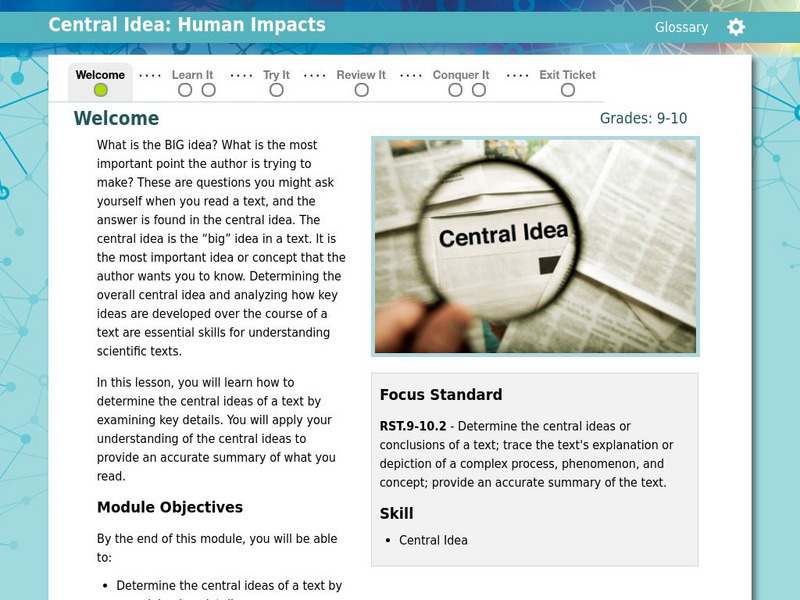

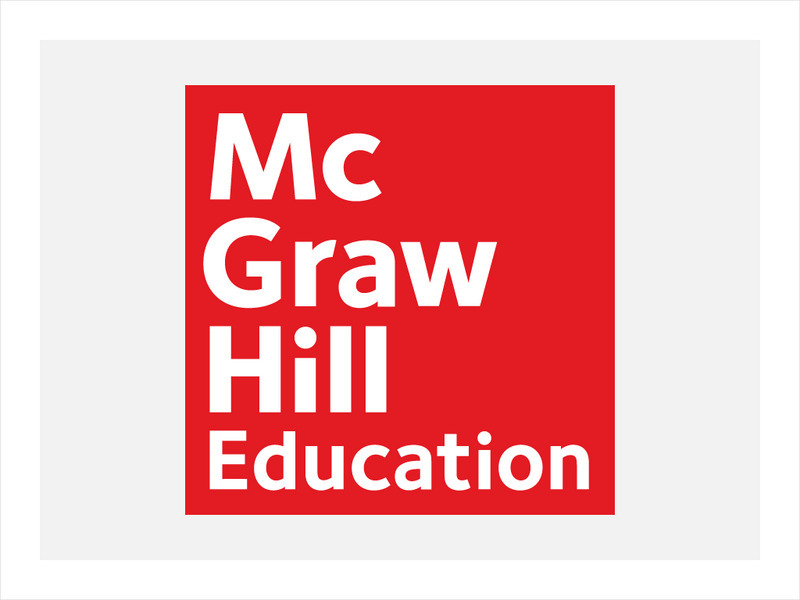
![De Paul University: Center for Urban Education: Analyze Nonfiction: Central Idea [Pdf] Graphic De Paul University: Center for Urban Education: Analyze Nonfiction: Central Idea [Pdf] Graphic](https://d15y2dacu3jp90.cloudfront.net/images/attachment_defaults/resource/large/FPO-knovation.png)
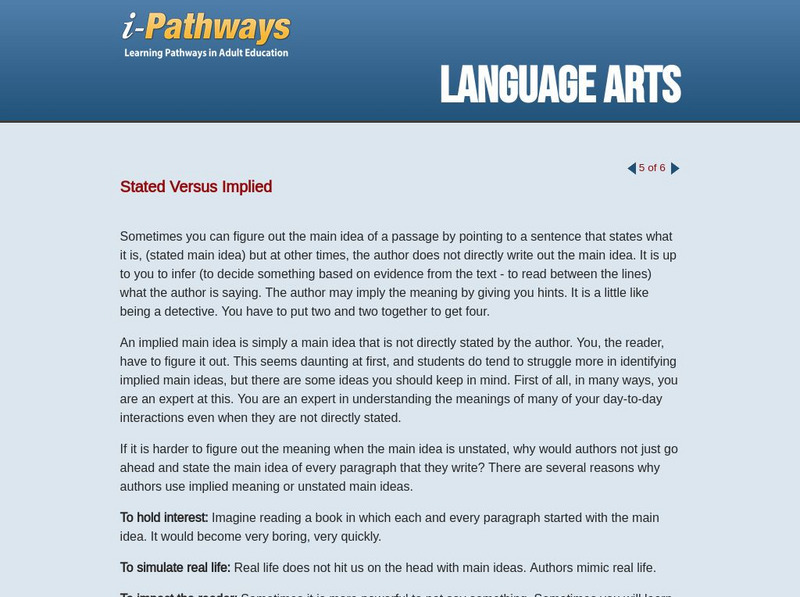
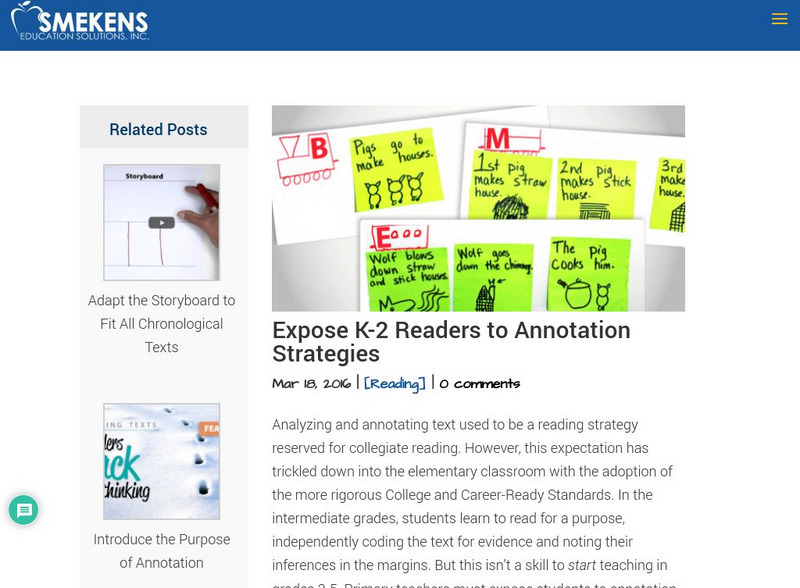


![Florida Center for Reading Research: Expository Exploration [Pdf] Lesson Plan Florida Center for Reading Research: Expository Exploration [Pdf] Lesson Plan](https://content.lessonplanet.com/knovation/original/509114-1621b87800788ad03f8f6464b347c698.jpg?1661786951)
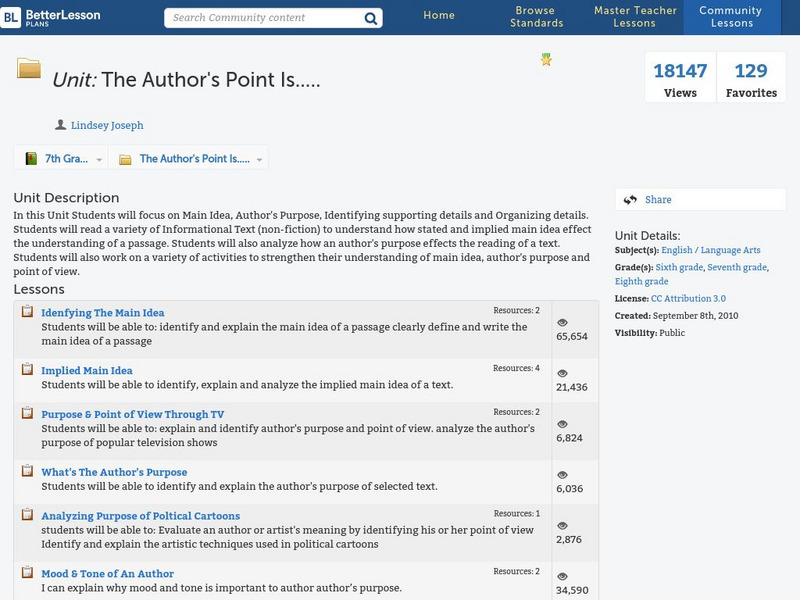
![Florida Center for Reading Research: Classifying Info [Pdf] Lesson Plan Florida Center for Reading Research: Classifying Info [Pdf] Lesson Plan](https://content.lessonplanet.com/knovation/original/509096-8cdfbf6a2bb73b8aba0c98e84cd1f596.jpg?1661786980)


